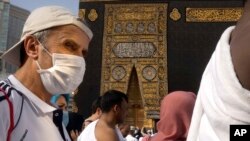Analysts say they see some Middle Eastern countries adopting strong measures to combat COVID-19 even as it continues to spread, while others are maintaining a cloak of secrecy about the infection rates. From the closure of Muslim pilgrimages and sweeping state of emergency declarations, coronavirus has introduced unprecedented changes, upending the region’s daily life.
Saudi Arabia plans to convene a virtual summit next week bringing together the leaders from the Group of 20 major economies, in a bid to improve coordination of efforts to fight the coronavirus pandemic and see what is working, and what is not.
Jordanian analyst Osama al Sharif says some Mideast governments are taking the necessary steps ahead of their Western counterparts.
"Saudi Arabia, Jordan and Israel, I think they did a much better job than many Western countries. Look at Italy, Spain, Germany, UK and US all of them were very late in realizing how dangerous this pandemic is and taking public measures to contain and mitigate it," he said.
Coronavirus strategies shifted in Britain and the U.S. in recent days following an ominous report by London’s Imperial College COVID-19 Response Team. It warned that the approach of trying to slow rather than actively halt the disease could overwhelm the number of intensive care hospital beds, and predicted that strategy could lead to about 250,000 deaths in Britain and more than one million in the United States in this pandemic.
Hong Kong has received praise for responding promptly in February and working in a bold yet transparent manner. Analysts have also given high marks to some countries in the Middle East.
Workers hose down vehicles and transportation hubs in the Jordanian capital, Amman, with disinfectant in the government’s bid to slow the spread of COVID-19.
Jordan, now under a state of emergency, has joined other countries in enforcing a lockdown after its single case of coronavirus grew to 56 as of Thursday. Borders, airports, schools, government offices, shops, except food stores and pharmacies, are shuttered. The military is enforcing no movement between provinces. Saudi Arabia has enacted similar stringent measures with latest numbers of cases reported as 238.
"Especially, the Saudis were quick to react from the first or second week of the news that the virus was spreading, and they are still taking tough measures," he said. "And Jordan is doing a good job by taking these really unprecedented measures to protect the public at a time when we are facing a difficult economic situation. They deployed the army. Israel was also quick to close its borders and suspend all international flights."
Souha Kanj, a professor of medicine and chair of the Infection Control and Prevention Program at the American University of Beirut Medical Center, says dealing with the coronavirus outbreak in the Mideast is complex given the mix of rich and poor states and different health infrastructures. The huge influx of refugees has already challenged its healthcare systems.
She also notes there has been under-reporting in some places.
Syria, she says, has not reported any coronavirus cases, despite its close ties to Iran, where numbers mount. Syria’s fragile health system is likely incapable of detecting and responding to the epidemic, Kanj adds, saying the same likely applies to Yemen.
The World Health Organization says it will start testing for coronavirus in the opposition-held northwestern Syria later this week. This is raising concerns of a potential catastrophic outbreak in Syria.




